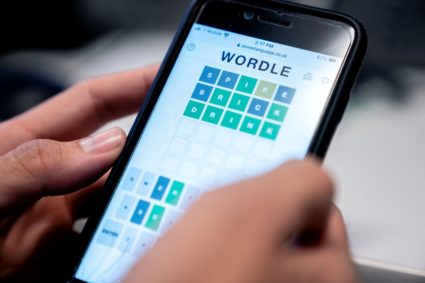
The Alvin Ailey American Dance Theater has just launched a 20-city U.S. tour under its new artistic director Alicia Graf…

In recent weeks, a web-based word puzzle called Wordle has become a popular daily distraction. Suddenly, millions of people are focused on their vocabulary of five-letter words, and are newly aware of concepts like letter frequency and letter position as they strategize about the best opening words and faster solutions.
For these people, Wordle is captivating. Previous research can help us understand how our brains respond to word games, and why we love them.
Wordle is a single-player puzzle that combines elements of several games, including Scrabble and Battleship. My colleagues and I have studied Scrabble as a way of understanding how language is processed in the brain, and how that processing changes with experience.
Competitive Scrabble players are people who spend a great deal of time playing Scrabble, competing in Scrabble tournaments, memorizing word lists and practising anagramming — shuffling sets of letters to create different words.
Much like chess players, competitive Scrabble players are ranked in an international rating system based on tournament results. We recruited competitive players from Scrabble tournaments and clubs and gave them a series of tasks to understand how all of this Scrabble practice and play alters their mental processes.
In our first study, we found that competitive Scrabble players recognized words faster than those who didn't routinely play Scrabble, particularly when words were presented vertically. Vertical word presentation is unusual in written English but common in Scrabble, and competitive players are very good at recognizing vertical words.
We also found that Scrabble players quickly recognized words without fully processing word meaning. This is probably because in Scrabble, you need to know whether different strings of letters make up legal plays, but you don't actually need to know what those words mean.
We also used brain imaging to study how all those years of intensive practice might have altered brain processes for language in competitive Scrabble players.
We found that when recognizing words and making simple decisions about them, competitive Scrabble players used a different network of brain areas than those who didn't play Scrabble competitively. Scrabble experts made use of brain regions not typically associated with word meaning retrieval, but rather those associated with visual memory and perception.
We wondered whether the effects of Scrabble practice that we observed in competitive players have benefits beyond Scrabble. Does playing lots of Scrabble make you good at anything else? The answer seems to be no.
We investigated that question by giving competitive Scrabble players and a group of Scrabble non-experts a task that was similar to Scrabble but used symbols instead of letters. In that task, Scrabble players were no better than anyone else in terms of their processing speed or accuracy.
We also investigated whether Scrabble expertise protects players from the effects of brain aging. Again, the answer seems to be no. Older Scrabble players still show the normal effects of aging, like slower processing speed.
In both Scrabble and Wordle, players need to search their word memory based on letters, shuffle letters across positions to find solutions or plays — the meaning of the words is irrelevant. Because of these similarities, many of the brain processes involved in Scrabble are probably also engaged when solving Wordles.
Our research with people who are not Scrabble experts shows that mental processes start to change quite quickly when people are asked to take on a new word recognition task. That means it's very likely your Wordle habit has already caused slight changes in the brain processes you use to solve the puzzles.
Those changes help you to play Wordle, but probably don't help you with anything else.
Wordle has become a habit for millions, but for others it's not appealing.
There are probably lots of reasons for this, but one explanation could be differences in what people find motivating. Some people enjoy puzzles and thinking challenges more than others. This type of motivation is referred to as need for cognition, and people who have a high need for cognition tend to seek out mental challenges like word games and puzzles.
Duolingo watching me do the wordle every day pic.twitter.com/GyGpDZcFkl
— Lauren Scharf (@LLcoolscharf) January 20, 2022
In Scrabble, there are usually multiple possible plays that could advance the game, but Worldles have a single right answer. With only one Wordle released per day, everyone is solving the same puzzle. The online game's sharing options also allow us to share our results with others without giving the answer away.
That means Wordle is also creating an opportunity for shared experience at a time when many people are feeling disconnected from others. A Wordle habit is not likely to make you smarter or ward off brain aging, but it may give you a daily dose of complex cognition combined with social interaction — and that can be a very good thing.
This article is republished from The Conversation under a Creative Commons license. Read the original article.
![]()
Sustain our coverage of culture, arts and literature.